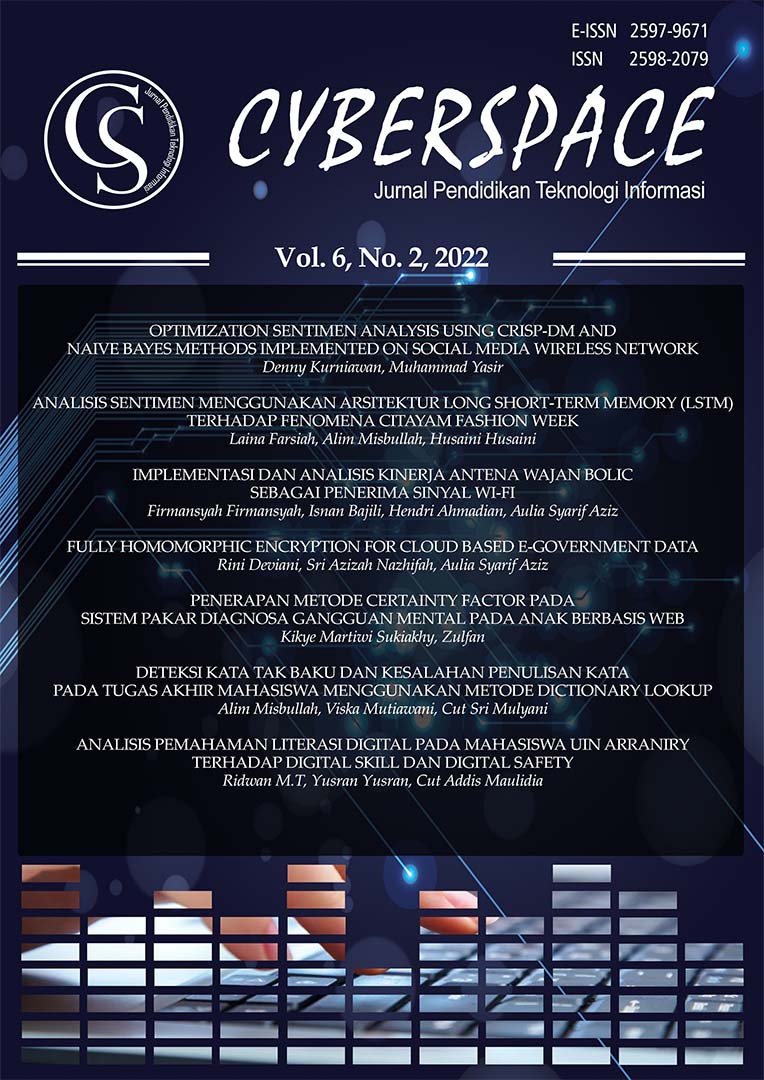ANALISIS SENTIMEN MENGGUNAKAN ARSITEKTUR LONG SHORT-TERM MEMORY (LSTM) TERHADAP FENOMENA CITAYAM FASHION WEEK
DOI:
https://doi.org/10.22373/cj.v6i2.14687Keywords:
sentiment analysis, deep learning, LSTM, tweet, Citayam Fashion WeekAbstract
Analisis sentimen pada teks bertujuan untuk melihat sebuah teks mengandung emosi positif, negatif, atau netral. Hasil analisis dapat digunakan sebagai bahan pertimbangan untuk mengambil keputusan terhadap sebuah isu. Seperti fenomena Citayam Fashion Week yang ramai diperdebatkan di Indonesia, khususnya pada bulan Juli 2022, sangat dibutuhkan analisis sentimen terhadap fenomena tersebut. Dataset yang digunakan berasal dari tweet masyarakat Indonesia dengan kata kunci Citayam Fashion Week. Selanjutnya, setiap tweet akan dilabeli dengan kelas positif, negatif, atau netral berdasarkan leksikal bahasa Indonesia. Penelitian ini menghasilkan model yang dapat digunakan untuk memprediksi setiap tweet bahasa Indonesia ke dalam kategori sentimen positif, negatif, atau netral terkait pandangan dan pendapat masyarakat tentang fenomena Citayam Fashion Week. Metode membangun model yang digunakan, yaitu Long Short Term Memory (LSTM). Akurasi model yang dihasilkan menggunakan LSTM cukup baik, yaitu sebesar 88%.
References
M. Choirul Rahmadan, A. Nizar Hidayanto, D. Swadani Ekasari, B. Purwandari, and Theresiawati, “Sentiment Analysis and Topic Modelling Using the LDA Method related to the Flood Disaster in Jakarta on Twitter,” Proc. - 2nd Int. Conf. Informatics, Multimedia, Cyber, Inf. Syst. ICIMCIS 2020, pp. 126–130, Nov. 2020, doi: 10.1109/ICIMCIS51567.2020.9354320.
H. P. P. Zuriel and A. Fahrurozi, “Implementasi Algoritma Klasifikasi Support Vector Machine Untuk Analisa Sentimen Pengguna Twitter Terhadap Kebijakan Psbb,” J. Ilm. Inform. Komput., vol. 26, no. 2, pp. 149–162, 2021, doi: 10.35760/ik.2021.v26i2.4289.
A. D. Widiantoro, A. Wibowo, and B. Harnadi, “User Sentiment Analysis in the Fintech OVO Review Based on the Lexicon Method,” 2021 6th Int. Conf. Informatics Comput. ICIC 2021, 2021, doi: 10.1109/ICIC54025.2021.9632909.
T. D. Dikiyanti, A. M. Rukmi, and M. I. Irawan, “Sentiment analysis and topic modeling of BPJS Kesehatan based on twitter crawling data using Indonesian Sentiment Lexicon and Latent Dirichlet Allocation algorithm,” J. Phys. Conf. Ser., vol. 1821, no. 1, Mar. 2021, doi: 10.1088/1742-6596/1821/1/012054.
B. S. Rintyarna, “Mapping acceptance of indonesian organic food consumption under COVID-19 pandemic using sentiment analysis of Twitter dataset,” Journal of Theoretical and Applied Information Technology, 2021. https://www.researchgate.net/publication/351990259_Mapping_acceptance_of_indonesian_organic_food_consumption_under_COVID-19_pandemic_using_sentiment_analysis_of_Twitter_dataset (accessed Jul. 27, 2022).
B. S. Rintyarna et al., “Modelling Service Quality of Internet Service Providers during COVID-19: The Customer Perspective Based on Twitter Dataset,” Informatics, vol. 9, no. 1, Mar. 2022, doi: 10.3390/informatics9010011.
Dr. G. S. N. Murthy, Shanmukha Rao Allu, Bhargavi Andhavarapu, and Mounika Bagadi, Mounika Belusonti, “Text based Sentiment Analysis using LSTM,” Int. J. Eng. Res., vol. V9, no. 05, May 2020, doi: 10.17577/ijertv9is050290.
E. H. J. Kim, Y. K. Jeong, Y. Kim, K. Y. Kang, and M. Song, “Topic-based content and sentiment analysis of Ebola virus on Twitter and in the news,” J. Inf. Sci., vol. 42, no. 6, pp. 763–781, Dec. 2016, doi: 10.1177/0165551515608733.
H. P. Suresha and K. Kumar Tiwari, “Topic Modeling and Sentiment Analysis of Electric Vehicles of Twitter Data,” Asian J. Res. Comput. Sci., pp. 13–29, Oct. 2021, doi: 10.9734/AJRCOS/2021/V12I230278.
A. M. Alayba, V. Palade, M. England, and R. Iqbal, “Arabic language sentiment analysis on health services,” pp. 114–118, Oct. 2017, doi: 10.1109/ASAR.2017.8067771.
S. Poria, I. Chaturvedi, E. Cambria, and F. Bisio, “Sentic LDA: Improving on LDA with semantic similarity for aspect-based sentiment analysis,” Proc. Int. Jt. Conf. Neural Networks, vol. 2016-October, pp. 4465–4473, Oct. 2016, doi: 10.1109/IJCNN.2016.7727784.
F. Mazzoni, V. Marsili, S. Alvisi, and al -, “Latent Dirichlet Allocation (LDA) for Sentiment Analysis Toward Tourism Review in Indonesia,” J. Phys. Conf. Ser., vol. 801, no. 1, p. 012073, Jan. 2017, doi: 10.1088/1742-6596/801/1/012073.
I. R. Putri and R. Kusumaningrum, “Latent Dirichlet Allocation (LDA) for Sentiment Analysis Toward Tourism Review in Indonesia,” Journal of Physics: Conference Series, 2017. https://iopscience.iop.org/article/10.1088/1742-6596/801/1/012073/meta (accessed Jul. 28, 2022).
J. Ye, X. Jing, and J. Li, “Sentiment Analysis Using Modified LDA,” Lect. Notes Electr. Eng., vol. 473, pp. 205–212, 2018, doi: 10.1007/978-981-10-7521-6_25/COVER.
M. Tripathi, “Sentiment Analysis of Nepali COVID19 Tweets Using NB, SVM AND LSTM,” J. Artif. Intell. Capsul. Networks, 2021, doi: 10.36548/jaicn.2021.3.001.
P. K. Jain, V. Saravanan, and R. Pamula, “A Hybrid CNN-LSTM: A Deep Learning Approach for Consumer Sentiment Analysis Using Qualitative User-Generated Contents,” Trans. Asian Low-Resource Lang. Inf. Process., vol. 20, no. 5, Jul. 2021, doi: 10.1145/3457206.
P. M. Sosa and C. Yang, “Twitter Sentiment Analysis using combined LSTM-CNN Models Related papers Recent Trends in Deep Learning Based Nat ural Language Processing,” 2017.
S. Wen et al., “Memristive LSTM Network for Sentiment Analysis,” IEEE Trans. Syst. Man, Cybern. Syst., vol. 51, no. 3, pp. 1794–1804, Mar. 2021, doi: 10.1109/TSMC.2019.2906098.
F. Koto and G. Y. Rahmaningtyas, “Inset lexicon: Evaluation of a word list for Indonesian sentiment analysis in microblogs,” Proc. 2017 Int. Conf. Asian Lang. Process. IALP 2017, vol. 2018-Janua, pp. 391–394, Feb. 2018, doi: 10.1109/IALP.2017.8300625.
Downloads
Published
Issue
Section
License
Authors who publish with Cyberspace Journal agree to the following terms:
- Authors retain copyright and grant the journal right of first publication with the work simultaneously licensed under a Creative Commons Attribution License that allows others to share the work with an acknowledgement of the work's authorship and initial publication in this journal.
- Authors are able to enter into separate, additional contractual arrangements for the non-exclusive distribution of the journal's published version of the work (e.g., post it to an institutional repository or publish it in a book), with an acknowledgement of its initial publication in this journal.
- Authors are permitted and encouraged to post their work online (e.g., in institutional repositories or on their website) prior to and during the submission process, as it can lead to productive exchanges, as well as earlier and greater citation of published work (See The Effect of Open Access).

